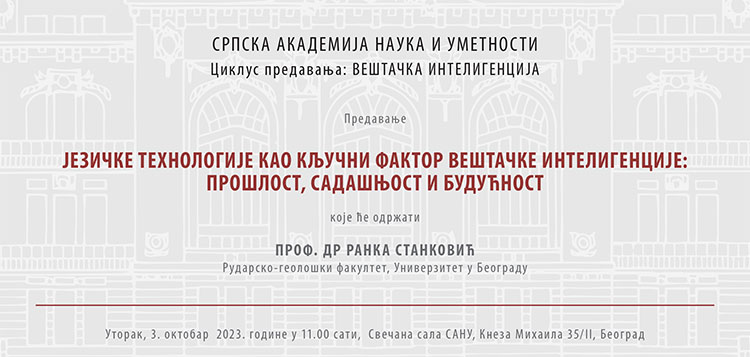LECTURE ’LANGUAGE TECHNOLOGIES AS A KEY FACTOR OF ARTIFICIAL INTELLIGENCE: THE PAST, PRESENT AND FUTURE’
As part of the lecture series ‘Artificial Intelligence’, Professor Ranka Stanković, DSc, delivered a lecture titled ‘Language Technologies as a Key Factor of Artificial Intelligence: The Past, Present and Future’ at the SASA Grand Hall, on 3 October.
Language technologies possess great potential for the future of artificial intelligence. Ever since the emergence of the first commercial computers, machine translation has been under development. Nowadays, language technologies have considerably developed thanks to machine and deep learning, and methods of analysis and flagging have been developed. Through the Internet, humongous amounts of lexical resources are available, which paved the way for the creation of large text corpora which can be used for training and evaluation of language models. Lexical resources allow the development of new applications for researchers, while for some tasks they are simply irreplaceable. In future, the development of language technologies shall be based on large and abundant lexical resources. Powerful applications are available for big world languages for automatic translation; text generating, question answering, analysis of attitudes and emotions underlining a text, information extraction, detection of the language of hate and other functions. The Serbian language is falling behind considerably when it comes to resources and tools development.
The lecture looked into some of the language resources and technologies developed for the Serbian language by the Language Resources and Technologies Society, starting with the corpus and lexical bases, models for annotations, and big language models for text generation.
Professor Ranka Stanković, DSc, is an associate professor at the Department of Applied Mathematics and Informatics of the Faculty of Mining and Geology of the University of Belgrade. She gives lectures on several subjects in the fields of informatics, statistics and geoinformatics. She also lectures Programming for Linguists, Text Information Extraction and Semantic Web on Multidisciplinary Studies at the University of Belgrade. She is a vice-president of the ЈERTEH Language Resources and Technologies Society, Chairman of Technical Committee A037 Terminology at the Institute for Standardization of Serbia, the Head of the Computer Centre of the Faculty of Mining and Geology, and leader of several national software projects.
She has published more than 140 scientific and expert papers in prestigious journals, monographs and conference proceedings, most of which are related to language technologies. She spearheaded domestic and foreign projects together with her colleagues brought together in the Language Resources and Technologies Society, and she published numerous resources and tools, many being available for open access at the European Language Grid platform (ELG, European Language Network). She is a member of two W3S research groups: Ontology-Lexicon and Best Practices for Multilingual Linked Open Data.

